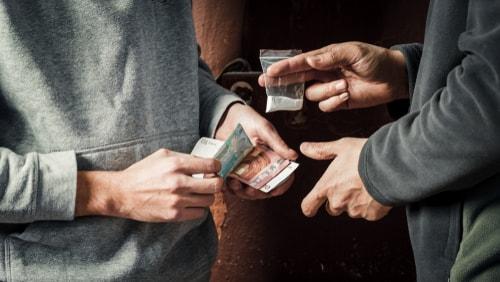How Are Drug Dealers Punished in Illinois?
 Marijuana will soon be legal for recreational purposes in Illinois, however, there are still specific dispensaries that will sell the drug. Other illegal substances such as opioids and narcotics are not to be sold in the state or brought into Illinois from other states/countries. Selling or trafficking illegal substances is breaking the Illinois Controlled Substance Act, and can lead to a drug crime conviction punishable as a felony. Consequences vary depending on the amount of drugs involved in the violation.
Marijuana will soon be legal for recreational purposes in Illinois, however, there are still specific dispensaries that will sell the drug. Other illegal substances such as opioids and narcotics are not to be sold in the state or brought into Illinois from other states/countries. Selling or trafficking illegal substances is breaking the Illinois Controlled Substance Act, and can lead to a drug crime conviction punishable as a felony. Consequences vary depending on the amount of drugs involved in the violation.
What Is Illinois Controlled Substance Act?
Illinois created the Controlled Substance Act to clearly define what would happen if a drug dealer is caught during a sale or if someone is found trafficking in drugs from other states. The law covers controlled substances, counterfeit substances, and controlled substance analogs.
The Act includes detailed accounts for what type of felony punishments a person can face if they are charged with drug dealing of substances such as cocaine, morphine, methamphetamines, and LSD:
- 15-100 grams: 6-30 years in prison and up to $500,000 in fines
- 100-400 grams: 9-40 years in prison and up to $500,000 or equal street value in fines
- 400-900 grams: 12-50 years in prison and up to $500,000 or equal street value in fines
- Over 900 grams: 15-60 years in prison and up to $500,000 or equal street value in fines
The act of drug trafficking has harsher punishments. Based on the amount of the controlled substance brought into Illinois, the offender will face no more than double the amount of prison time and fines as listed above.
If someone uses a telecommunication device as a way to help traffic drugs into Illinois, they will be charged with a further Class 2 felony punishable as a fine of up to $100,000.
Defensive Strategies when Facing Drug Charges
A prosecutor will need to have sufficient evidence that a drug deal occurred in order to earn a conviction. Most of the time, a dealer operates out of their home, so the best defense can be that their 4th Amendment rights were violated. If the police performed an illegal search and seizure or photos were taken inside the house from outside without the owner’s permission, that evidence can be thrown out of the case.
Other defenses include:
- Claiming the drugs were planted as an entrapment plot
- Claiming the offender did not know about the drugs or had no part in the deal
- Mistaken identity of the substance. The substance could be harmless and not a drug, so it is always analyzed before going to court as evidence
- Claiming the offender was forced into selling the drugs for someone else’s purposes
Contact a Chicago, IL Drug Crimes Lawyer
With the drug laws changing - at least for marijuana - the judicial system can be a complicated place to navigate. Those facing drug crime charges should hire a lawyer from Luisi Legal Group to help build a solid defense strategy to avoid a conviction. To schedule a free consultation with a Chicago drug crimes defense attorney, call 773-276-5541.
Sources:
http://www.ilga.gov/legislation/ilcs/ilcs4.asp?DocName=072005700HArt%252E+IV&ActID=1941&ChapterID=53&SeqStart=5200000&SeqEnd=7900000
https://www.iwu.edu/counseling/Illinois_Drug_Laws.htm





 773-276-5541
773-276-5541










